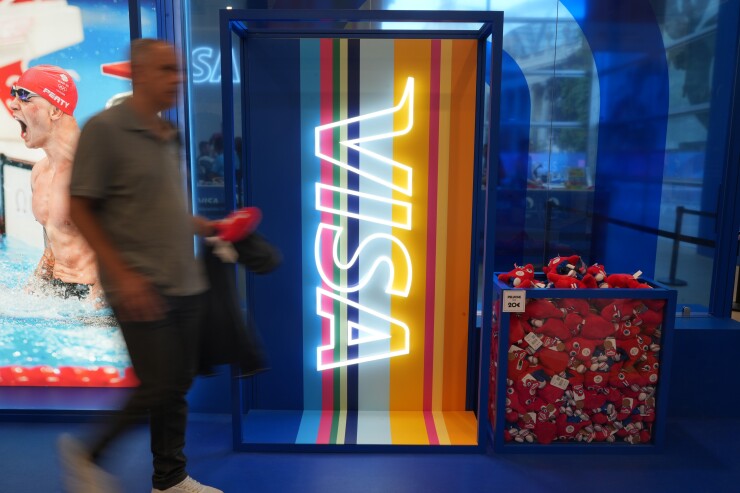
Even though buy now/pay later is a rival product to credit cards, Visa and Mastercard have both embraced installments, with Visa adding BNPL fintech Affirm as the card brand's initial U.S. partner for Visa's Flexible Credential, a product that enables consumers to use a single card account for different payment options.
The popularity of BNPL has left the credit card industry with little choice but to offer installments as a way to protect long-standing relationships with card issuers and merchants.
Forty seven percent of consumers say BNPL has allowed them to make a purchase, with 60% of Gen Z and 66% of millennials saying they are likely to use BNPL in the future, according to
The researchers found that BNPL can enable merchants to sell higher-price products to consumers who would otherwise not be able to afford the purchase. "Consumers have been attracted to pay over time for a number of reasons," said Mark Nelsen, head of consumer payments product at Visa. "It's an alternative to traditional credit cards. So we're tapping into global momentum."
Global flexibility
Visa's Flexible Credential deal with Affirm expands Visa's existing support for Affirm, making it easier for consumers to navigate to BNPL.
"We're always exploring ways to expand Affirm's reach. Through long-standing partnerships like the one we have with Visa, we're able to bring Affirm's flexible and transparent payment options to more people on both sides of our network," said an Affirm spokesperson in an email.
Initially launched in May, Visa Flexible Credential lets banks issue a single card that can switch between payment methods. A consumer could pay using a debit or credit card, or BNPL, at the point of sale, rather than using different accounts. Consumers can also set preferences, such as routing purchases below $200 to debit, more than $200 to credit and certain merchant categories to BNPL or installments. Visa has also partnered with Liv, a digital bank in the UAE, to expand Flexible Credential in the Middle East.
Flexible Credential's expansion is an acknowledgement that consumers have different cards, and there's competition to enroll customers for a service that makes it easier to juggle those cards. Visa is also competing with Curve, a company that sells an all-in-one flexible card. Curve recently
"Consumers often have separate cards or credentials for different purposes," Nelsen said, noting Affirm Card has more than one million active consumers. There is an opportunity to boost user bases for both firms, Nelsen said.
Visa's initial adopters for Flexible Credential include Japan's Sumitomo Mitsui Card Company, which has signed up three million users since launch in June. Visa and SMCC are also testing a feature that enables small businesses to switch between personal and business accounts on the same card.
The card network effect
Mastercard also offers a version of flexible credential. In an email, Mastercard's public relations office said the card brand enables consumers to digitally pre-set or switch payment methods such as debit, credit, installments, prepaid, and rewards within an issuer's app based on their needs and preferences. The Mastercard product is live with partners across Asia Pacific, the Middle East and Africa. "We're scaling the solution globally next year, allowing more consumers to experience better financial health and optionality," Mastercard said.
"The flexible credential has the potential to be disruptive, but like any other new technology, adoption will be critical," said Tony DeSanctis, senior director at Cornerstone Advisors. "In many ways, this is a bit of a 'me-too' digital wallet, with multiple credentials stored in the users' device or mobile banking app."
The question of adoption is how interoperability will be managed or required, DeSanctis said. "If I am a community bank, do I need to enable support for Affirm, which could potentially take volume from my credit card? It is a little late to launch a wallet-like solution, but I would not count out a big player like Visa to make this successful."
Visa championing this idea is important for getting it more widely accepted beyond the largest issuers, which have introduced their own proprietary BNPL, said Aaron McPherson, principal at AFM Consulting, noting that just as Apple Pay partnered with Affirm to offer a BNPL option, and plans to introduce other BNPL options, the Affirm Card is a model for other issuers to follow.
The Liv example is also intriguing, because it could be a model for travel and entertainment cards like American Express that are frequently used in other countries. That could shift the foreign exchange cost from the point of purchase to a foreign currency-denominated account here in the U.S., where you might have better rates than what you would get overseas, according to McPherson.
"This technology makes the card into a digital wallet, with the ability to switch payment types after the fact," McPherson said. "We've seen functionality like this before, but having Visa's support helps to standardize and democratize it, so I think we will see this sort of functionality become more common in 2025."






